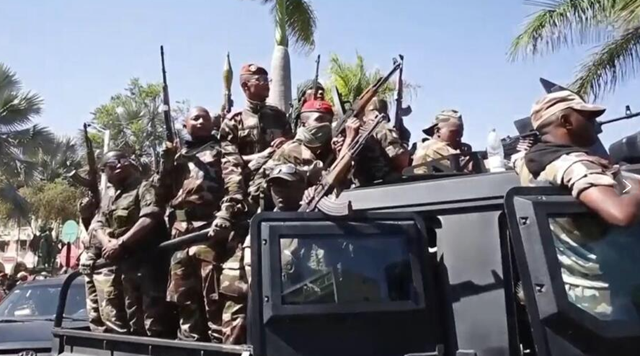Madagascar’s military said on Tuesday it has seized power, following weeks of protests against the fugitive president, Andry Rajoelina.
The constitution has been suspended and a presidential council made up of members of the army and gendarmerie has been established, Colonel Michael Randrianirina, commander of the CAPSAT special forces unit, said in front of the presidential palace in the capital, Antananarivo.
“We have taken the power,” Randrianirina announced. He said a prime minister would be appointed, who will soon form a civilian government.
Shortly before the military’s announcement, members of the National Assembly voted to impeach Rajoelina, who has fled the country. The lawmakers called for Madagascar’s Constitutional Court to determine the validity of the vote.
The military unit had already declared over the weekend that it had taken control of the island nation’s land, air and naval forces. Numerous soldiers joined the young people who had been demonstrating for weeks, primarily for better living conditions. The president’s office described the move as an attempted coup.
Earlier on Tuesday, Rajoelina announced on X that he had dissolved the National Assembly by decree to “restore order.”
Deputy Parliamentary Speaker Siteny Randrianasoloniaiko, questioned the legality of Rajoelina’s dissolution of parliament.
Rajoelina’s current whereabouts are unknown. In a live video address on Monday evening, he said he had to go to a “safe place” to protect his life. He did not comment on a possible resignation. Instead, he appealed to the people of his country to respect the existing order.
The French broadcaster RFI reported that Rajoelina was flown out of Madagascar on Sunday by a French military aircraft. Rajoelina was granted French citizenship in 2014.
The CAPSAT unit has played a role in power changes in Madagascar in the past, including helping Rajoelina come to power in a coup in 2009.
Following the coup, Rajoelina first served as transitional president from 2009 to 2014. He ruled as president from January 2019.
Since the end of September, young people in particular have been demanding Rajoelina’s resignation in sometimes violent demonstrations.
The uprisings were triggered by power and water outages, shortcomings in the education system, high unemployment and widespread poverty.
The security forces cracked down brutally on the protests, with 22 people killed in violent clashes in the first week of October alone, according to the United Nations.
The African Union convened an emergency meeting on Monday to discuss the situation in Madagascar. The organization spoke out against any unconstitutional change of power, and called on all parties to the conflict to engage in dialogue.
Source: GNA









Leave a Comment